Hajduk And Dinamo Got The Opponents For The Start Of European Season
Dinamo will play Macedonian Vardar, and Hajduk will face Romanian Iasi, both Croatian representatives will start with the away games
Sinj SFH Brings New Members from South Africa
Message from the Sinj Society of Friends of Hajduk (SFH) - We are the best SFH in the world and it is about time, that we get members from around the world!
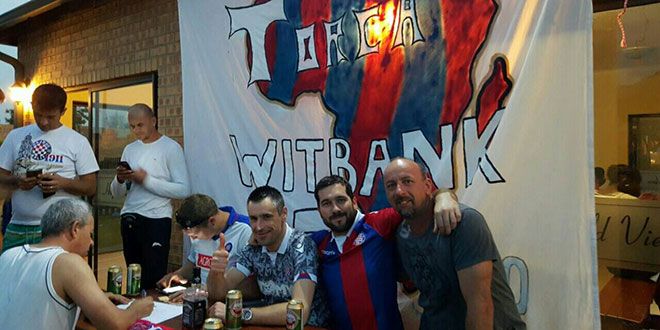
(photos: Dalmatinski Portal)
Hajduk Split turned 105 yesterday and as a special birthday gift, several people from Sinj currently living in South Africa organised a membership sign-up for Hajduk in Witbank trough the SFH Sinj. According to Dalmatinski portal, there are 48 new members from South Africa and the number could even be bigger as the membership sigh-up action will proceed in the coming days.
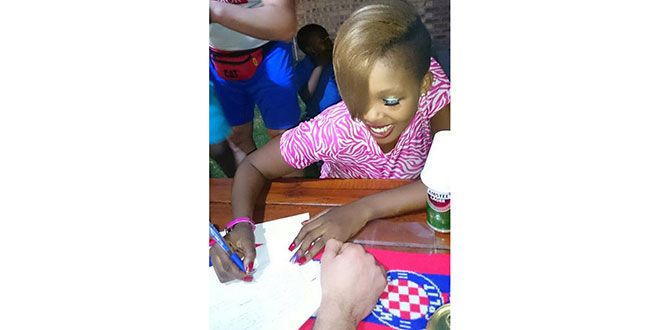
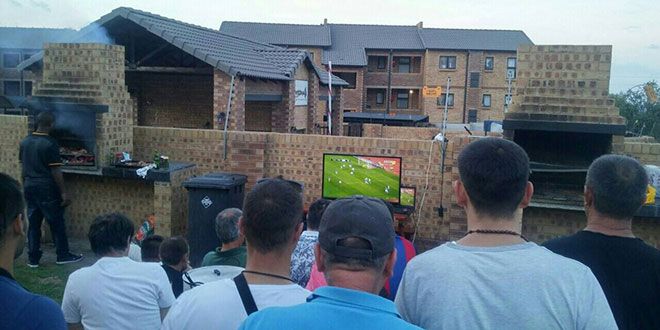
A Hajduk Scarf Keeps the Tin Ujevic Statue Warm in Imotski
I am not a football fan. As a foreigner and a woman in Dalmatia my lack of enthusiasm for Hajduk Split is respected. It might not be the case, if I was a local. Nevertheless, even though I am not a football fan and not following news too much, I still know, Hajduk Split is currently encouraging people all over Dalmatia to become members of the club. The goal for this year is 15.000 members and 50.000 should be reached by the end of this decade.
And so, it is not surprising to see the statue of Tin Ujevic in Imotski covered in a scarf of Hajduk Split as Dalmacija News reported yesterday January 13, 2016. It might be to keep Tin Ujevic warm, but for many in Imotski and Dalmatia, he just looks much better like this!!
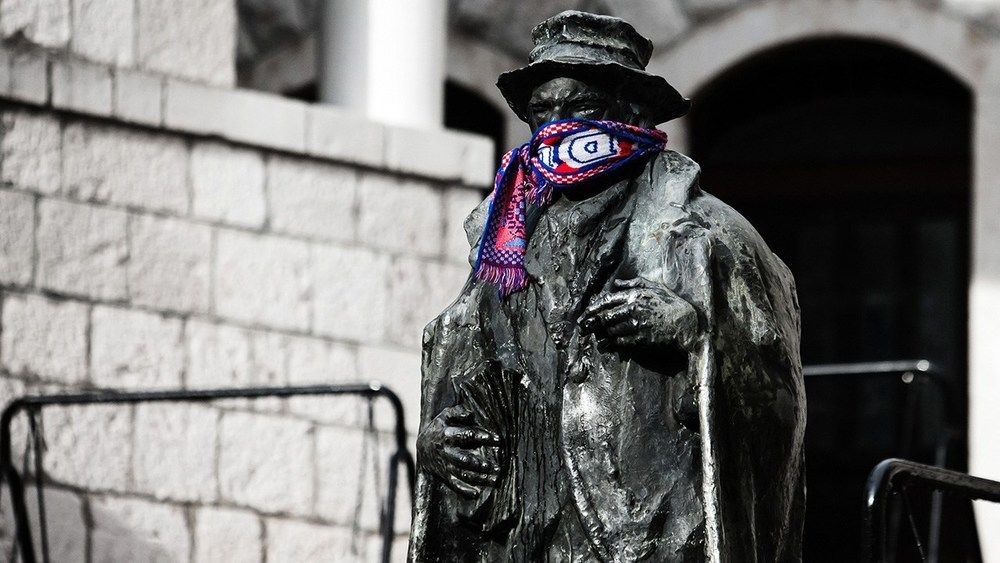
(photo: Milan Šabić / CROPIX)
Hajduk Split vs. Estonian Kalev Sillamae in Dugopolje Tomorrow
Whenever I write an article, I am keen to write honestly about how I feel and think about the subject. This simple rule is working for me in most cases, but there are times, when I have to write about football. And I have an issue with football. Not to bore you with details (which if interested, you can find in these articles - here and here), I really do not care about football and know nothing about it.
And here I am presenting you with the fabulous event of tomorrow, when Hajduk Split will be playing against Kalev Sillamae (Estonia) - qualifying game for the European UEFA league. Thankfully the most helpful director of the Dugopolje tourist board Tomislav Balić saved me with lots of information as the match will take place in Dugopolje "Croatian knights" Sports Center due to the Split Stadium being busy with Ultra Festival.
Information and pictures from Dugopolje tourist board:
"It is a great honour and a privilege for a small place like Dugopolje to host such a match and to be a part of the European football. We got a taste of what it feels like last year, when the other Split football club RNK Split was playing against Italian Torino in Dugopolje and the town was full of temperamental Italian fans, who prepared the ultimate fan experience at the stadium.
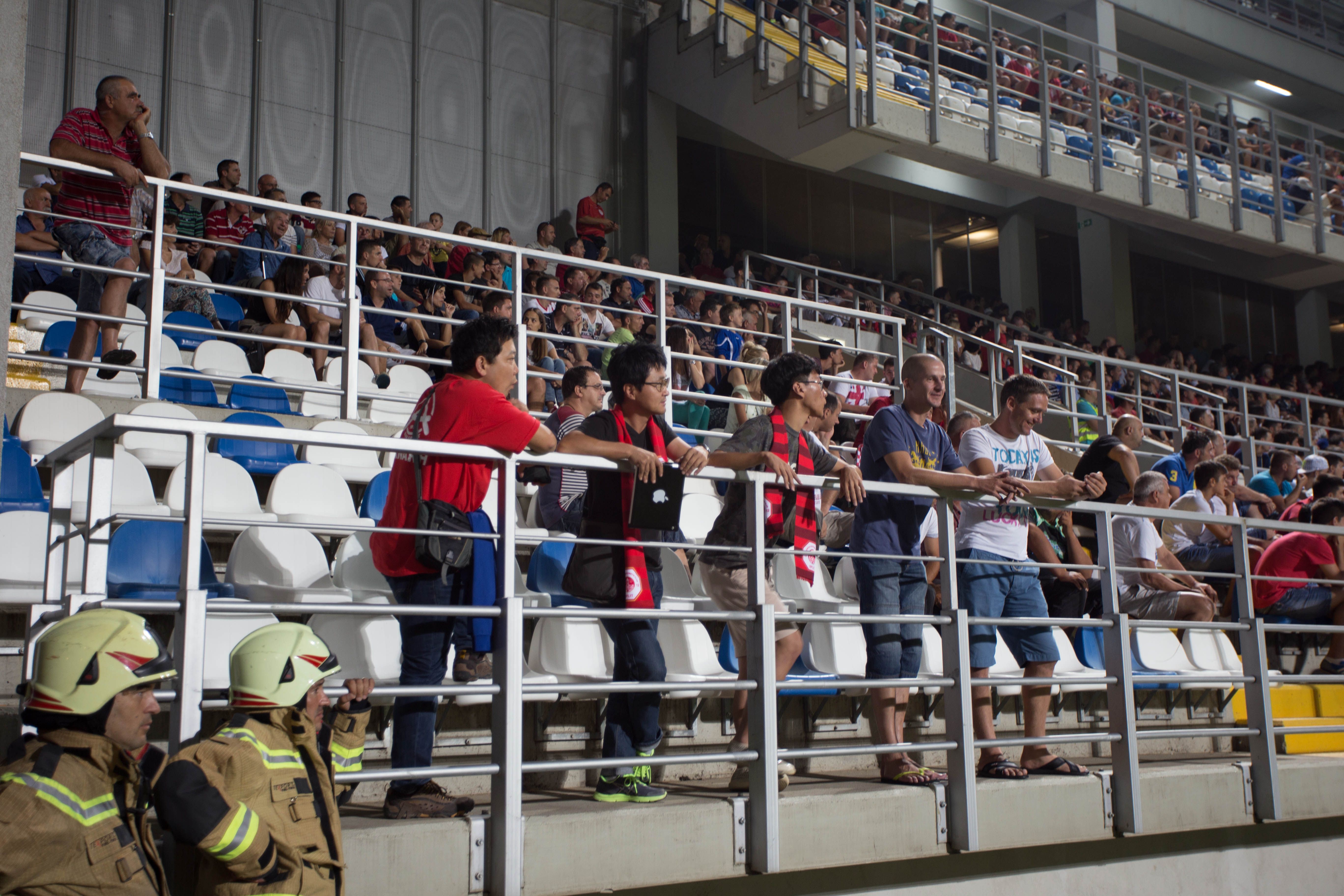
We expect a full stadium tomorrow and this time, the Hajduk fans - Torcida will take care of the proper Mediterranean football atmosphere. Match is planned for tomorrow July 9, 2015 at 19:00.
The Dugopolje Sports Center "Croatian knights" is the home of the NK Dugopolje and it is one of the most modern small stadiums in the region. The Stadium was build in 2009 and has a capacity of 5200 seats and all the licenses for playing an European football matche (except the Chamions League matches)."
(photo Z. Ajalbeg)
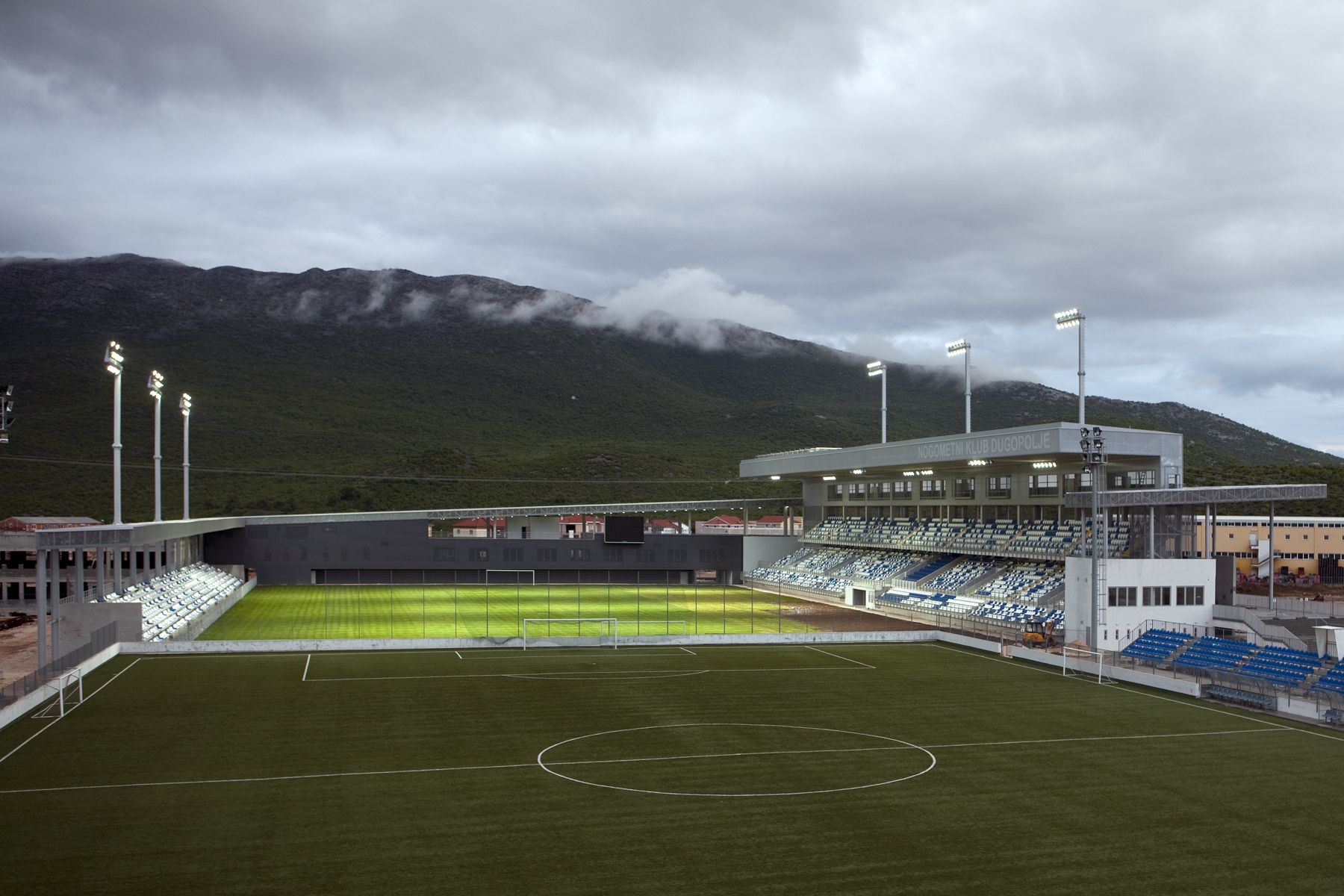
And Tomislav has more information about the Sports Center coming soon, so stay tuned!!
Sad Day For Football Fans: The Great Vladimir Is Gone
One of the biggest names ever to play with Hajduk FC, Vladimir Beara, passed away this Sunday, aged 85. This goalkeeper, who had his best days in 1950s and early 1960s, was considered one of the best goalkeepers in the world of his days, maybe even of all times. After all, Russian legend Lev Yashin, the only goalie ever to win Ballon d'Or once clearly said:
"I am not the best goalkeeper in the world, it is Vladimir Beara."
Beara was born near Sinj in 1928, and began his career in Hajduk's first team in 1947. He was a member of one of the best teams in history not only of Hajduk, but also of Croatian football, in 1950 they won Yugoslav championship undefeated, and then won two more titles in 1952 and 1955. Sixteen years later, he was assistant coach when Hajduk won another title. After Hajduk, Beara also played with Belgrade's Crvena zvezda, winning 4 more titles, and was awarded as the best player in Yugoslavia, as the first goalkeeper ever with that honour. Brief international career included Alemania from Aachen, and Viktoria Cologne, both Germany.
However, the most important part of his career, a part that made him internationally recognized, was the one connected with the Yugoslav national teams. He collected 60 caps, from 1950 to 1959, and played three World Cups. Yugoslavia was strong side at that time, and Beara contributed in winning Olympic silver in Helsinki 1952. By far, the biggest award came in 1953, when Beara played as the member of European team against England, accompanied with another Hajduk's legend Bernard Vukas, and Partizan Belgrade players Branko Zebec and Zlatko Čajkovski.
Witnesses of his play say he was spectacular goalie, attractive, very athletic and elegant. After all, read a story about Beara published in The Guardian few years ago. Title "Meet Yugoslavia's ballerina Beara, once the best keeper in the world".
In 2007 he was awarded with an introduction to the House of Glory of Split Sport.
Hajduk Re-opens Fan Shop
After renovation, football club Hajduk Split opened its fan shop on Saturday. Based right next to the official entrance to Poljud Stadium shop offers a wide range of souvenirs connected with the oldest first-league team in Croatia. Team uniforms, accessories, calendars, photos, etc.; all that can be found in newly renovated store. First buyer was first team chief coach Igor Tudor, and among guests was legendary goal keeper Vladimir Beara, one of the best in the world at his peak in 1950s.
Judging by first day, the best buy will probably be new club's equipment designed by Macron.
Hajduk Legends: Frane Matosic on the Split Riva in 1941
The more time I spend in Split, the more I realise how important Hajduk is to so many people in the city. I am regularly stopped by total strangers on the street asking if I am the English writer, and they are quick to give me advice on the best way to write about Hajduk, and who I need to talk to about the book.
The book is in progress, and Frane has done a great job with his contributions so far. There is no shortage of material, and one gentleman came up to me on the Prokurative the other day with a CD of 6000 pictures from 1911 on, as well as plenty of stories.
I really enjoyed meeting The Doctor, one of the two legendary fans at the 1991 cup final in Belgrade, and Frane has lined up some rather interesting interviews moving forward, including Mr Ivanišević, one of the founders of Torcida, who has kindly agreed to speak to us and be interviewed for the book.
Thanks also to Duško Sisarić for sending me this great pic of Hajduk legend Frane Matošić on the Split riva in 1941.
Belgrade 1991: Red Star 0, Hajduk 1. Only 2 Hajduk Fans Present. Meet The Doctor.
I had one of the most interesting coversations of the year earlier this week at Caffe Bajamonti with a lovely man who is a clock maker. I had been looking him or one other man - a policeman - for some time, and was grateful to my growing list of contacts in Split not only for finding him, but also for persuading him to speak to an English writer.
The reason I was looking for him was because he was a key part of one of the most remarkable stories I have come across about Hajduk Split in my research for our forthcoming book on the history of the club. This is what I had learned about events in May 1991 prior to our meeting.
Hajduk were due to travel to Belgrade for the Yugoslav cup final in May 1991, where they would face Red Star Belgrade. Things were tense in the region, with war imminent, and the first deaths had occurred the previous months in Plitvice. The Hajduk team flew up in a military plane, won the game 1-0 with a 65th minute winner from Alen Boksic (you can watch the game below) and flew straight home. The travelling support consisted of just two fans, who must have been totally crazy and totally committed to the Hajduk cause. Upon arrival in Split, the trophy was buried in the foundations of a building, where it lay untouched for twenty years. In February 2011, Hajduk celebrated 100 years of existence, but the trophy remained buried until the following May, when the law of 20 years' possession came into effect, and the trophy went to its permanent home in the Hajduk trophy room at Poljud.
An amazing story, and I really wanted to interview one of the two fans to include their story in the book. Far from being a standard history, I want the book to reflect the personality of Hajduk and its characters, and an interview with one of the fans was high on my list.
A couple of weeks ago, I received a text from a friend: "I have found one of the 1991 fans. His name is The Doctor, and he will talk to you. His number is..."
An interview with a hardcore Torcida called The Doctor. This was going to be interesting. My co-author Frane arranged the meet and introduced us at Bajamonti, then left us to chat. I was not sure what I was expecting, but what I found was a cultured, gentle clock maker, father of three drinking tea, a biker with lots of stories of his Torcida past. It was a lovely hour, and I will certainly be meeting him for a beer again. Rather than ask him about 1991, I asked him to tell me about his association with Hajduk, how it started, and then we could see where the conversation went.
"We must start with 9/11. Not Al Qaeda for September 11, 1971, the day I was born. My father bought me a 20-year membership for Hajduk, and a year for all the extended family. I was destined to be a Hajduk fan, whether I liked it or not. My first game. It was much later, and I don't remember exactly, but I was five, perhaps six months old. Yes, I went to games with my father as a baby."
One of the more interesting things I have learned about Hajduk is why so many people follow the club in Split. The old maternity hospital was right next to the old stadium, and so when a baby was born and the mother showed her child the outside world, the first thing they saw was the Hajduk stadium.
The Doctor got in with a crowd of hardcore fans and started to go to all the games, home and away all over former Yugoslavia. There were fights - good fights - with rival teams and the police, and this became a way of live. A few weeks before the first deaths in 1991, The Doctor and about 15-20 others went to a match in Banja Luka, where they got into a good fight, and they talked about the upcoming cup final in Belgrade in May. As the events in Plitvice unfolded, however, most of them realised the seriousness of the situation, concluding that a trip to Belgrade could result in loss of life if war was about to break out.
Not The Doctor. He announced he would go to the match, alone if necessary. There was only one other fan who agreed to join him on the journey - a policeman today. Due to the regional situation, the regular train via Knin was not an option, so they had to travel by bus along the coast to Ploce, then up by train through Bosnia. The two fans agreed to meet at Split Bus Station and The Doctor was surprised to see the future policeman arriving draped in an huge Croatian flag, and wearing... a sombrero!
As the train passed through Bosnia, some Bosnian Serbs going to the came joined the train. The Doctor went to the bar to get a beer, and his Croatian accent was immediately noticed, so he bought a case, went back to the compartment, locked it and sat drinking beer in silence with his companion, as the Bosnian Serbs went to look for them. Arriving at the stadium, they had the whole section to themselves and were surrounded by 5-6 policeman. The first thing they did was to unfurl the Croatian flag, and then they set about singing their Hajduk songs, just the two of them. This earned them a beating from the police.
The home fans did not believe they were really Croatian fans initially, thinking it was some kind of joke from the fans of the other Belgrade team, Partizan, but when the truth was known, one fan ran over and a fight ensued. The police intervened, and then asked The Doctor for his ID card. Instead of the ID card, he produced his passport, saying he had crossed an international border and so did not need the ID card. When the policeman saw the Yugoslav passport, he beat The Doctor again, for he had placed a flag of Croatia on the front cover.
About forty minutes before the game was due to finish, and a few minutes before the winning goal was scored, they were escorted from the stadium for their own safety. They heard some strange sounds from the home support when the goal went in, and assumed Hajduk had scored. At full time, they were taken to the Hajduk team bus, where the players were incredulous that they had travelled to the game. They returned home to a hero's welcome in Split, flying in the military plane with the team.
There was one more beating to come, however. As they were coming off the plane, The Doctor took the trophy from the hands of one of the players. A Split policeman saw this, ran up to The Doctor and hit him, assuming he was trying to steal it. The players came to the rescue and The Doctor just smiled:
"Don't worry, I am getting used to policemen beating me."
The story was told with humour, passion, detail, and I really enjoyed meeting him. There was just one question that remained, and I felt brave enough to ask it:
"Why do they call you The Doctor?" My mind had been racing with possibilities.
"Ah, that is a funny story. A year before the game, this guy started having some kind of fit. Everyone just stopped and stared. I took him, slapped him and threw some water on him, and he returned to normal. I had no idea what I was doing, but it seemed to work. Every since then, I have been called The Doctor."
A History of Hajduk Split by Paul Bradbury and Frane Grgurević will be published later this year.
Hajduk Mourns the Loss of Vladimir Geza Šenauer from the 1950's Golden Generation
One of the great legends of Hajduk Split passed away today, as the death of 83 year-old Vladimir Geza Šenauer was announced. Our condolences go out to his family. Although we never met, I did meet his son Miro on Christmas Eve, and we discussed an interview for our book on the history of Hajduk.
Born in Split in 1930, Geza was part of the so-called 'Golden Generation' of the 1950s, whose numerous triumphs including winning the league title without losing a single match in 1950 (see the 1950 team in the video below). In total, Geza played 471 times for Hajduk, scoring 132 goals.
A memorial service will be held at midday on January 9 at the Poljud stadium, with the funeral taking place at 15:00 at the Lovrinac cemetery, according to Slobodna Dalmacija.


